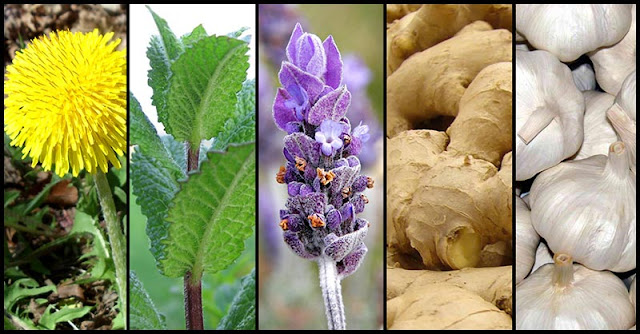Since the beginning of time, before the advent of synthetic drugs and modern-day medicine, ancient civilization relies solely on plants and herbs and use them strategically to treat all kinds of diseases and they are very good at it.
At present, the World Health Organization (WHO) estimates that 80 percent of the world’s total population still use herbal and traditional remedies as their primary tool for health care. On the other hand, the majority of the new drugs developed introduced in the U.S are derived from natural products, especially from plants.
Unfortunately, the use of medicinal plants in daily life is gradually declining as there are more doctors who recommend synthetic drugs over natural ones. But if you are really interested in using natural remedies to uphold your health, you can rejoice because there are a vast selection of plants and herbs that are easy to plant even in your own backyard.
If you want to harness the power of medicinal plants, below is an excellent starting point. It is just a portion of the countless medicinal herbs out there, but once you got yourself started, you’ll likely to explore more and get inspired by its healing wonders.
1. Ginger
Ginger is not only a wonderful addition to your cooking but it also has enough medicinal properties that can benefit your health. It is one of the spices I heavily recommend to always keep on hand in your kitchen at all times.
There are a lot of healing properties in ginger and this includes anti-inflammatory, antiviral, antioxidant, anti-nausea, antibacterial, and anti-parasitic. This is just some of its more than 40 scientifically approved pharmacological effects of ginger. The anti-inflammatory properties of ginger are effective against some forms of pain like menstrual pain, headaches, joint pains, and more.
Ginger also has some promising effects against cancer, non-alcoholic fatty liver disease, diabetes, bacterial and fungal infections, asthma, and nausea (especially during pregnancy).
2. Garlic
Garlic has immune-boosting, antiviral, antibacterial, and anti-fungal effects – eating a clove or two of fresh garlic a day can keep the doctor away. The sulfur-containing compounds in garlic, such as allicin, is what gives its distinct smell and therapeutic effects. The health benefits of garlic generally fall into four major categories:
Anti-inflammatory – garlic reduces inflammation in the body and reduces the risk of arthritis and other diseases associated with inflammation.
Immune Function Booster – garlic’s antibacterial, antiviral, antifungal, and anti-parasitic properties boost the body’s ability to fight off bacteria and other causes of disease.
Heart Friendly – garlic is effective in lowering blood pressure, protects against clotting, improves lipids, and retards plaque. It improves cardiovascular health and blood circulation and lowers your risk of heart diseases.
Cancer Fighting Properties – garlic is toxic to at least 14 kinds of cancer cells including lung, breast, gastric, brain, and pancreatic cancer cells.
3. Peppermint
Peppermint has excellent properties that benefit the respiratory system. It is effective against a cough, colds, asthma, tuberculosis, and allergies. When it comes to digestive health, peppermint oil is an excellent way to treat irritable bowel syndrome. It is an effective alternative to drugs like Buscopan in reducing colonic spasms.
Adding peppermint oil to your favorite tea may also relax your intestinal muscles to treat abdominal pain by allowing gas to pass. Inhaling the aroma of peppermint can offer stress relief and memory enhancement. It also acts as a decongestant and expectorant and may clear your respiratory tract.
Peppermint oil can also help relieve a cough, nasal congestion, and cold symptoms by using it as a cold rub on your chest or by inhaling it using a vaporizer. Peppermint essential oil is effective for headache pain, for dental care, and aromatherapy.
4. Lavender
With chemically complex structure and over 150 active constituents, lavender oil is rich in esters – an aromatic molecule with calming, stimulating, and anti-spasmodic (suppressing pain and spasms) properties. The main botanical components of the lavender oil are lalool (a non-toxic terpene alcohol that has natural germicidal properties), linalyl acetate, terpinen-4-ol, and camphor. Other known compounds of lavender oil that are responsible for its antiviral, anti-inflammatory and antibacterial properties are lavandulyl acetate, 1,8-ccineole, limonen, cis-ocimene, and geraniol.
Here are some medicinal uses of lavender oil:
- Relieve pain
- Treat several skin disorders like acne psoriasis, wrinkles, and eczema
- Keep your hair healthy
- Improve digestion
- Improve your blood circulation
- Relieve respiratory disorders
- Stimulate urine production
5. Dandelion
Dandelion is not just an ornamental flower. In fact, it is famous for traditional medicine as a liver tonic, effective in detoxification and improving liver function. It is also known as a stimulant that is practically used for liver and kidney disorders. Dandelion is also traditionally used to counteract and reduce the side effects of prescription drugs, treat infections, ease gallbladder problems, and reduce water retention and swelling.
Dandelion greens contain many nutrients including vitamin B6, riboflavin, vitamin C, thiamin, iron, calcium, manganese, and potassium. You can prepare it by simply blanching it in boiling water for 20 seconds to remove the bitter flavor. It is also particularly a good source of vitamin A and may also have anti-cancer properties.









